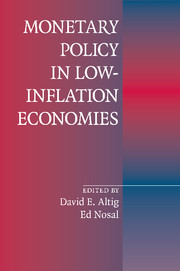Book contents
- Frontmatter
- Contents
- Contributors
- Acknowledgments
- Introduction
- 1 The Welfare Cost of Inflation in the Presence of Inside Money
- Commentary
- 2 An Open-Economy Model of Endogenous Price Flexibility
- Commentary
- 3 Efficient Inflation Targets for Distorted Dynamic Economies
- Commentary
- 4 Inflation and Welfare in Models with Trading Frictions
- Commentary
- 5 Good versus Bad Deflation: Lessons from the Gold Standard Era
- Commentary
- 6 Monetary Policy Orientation in Times of Low Inflation
- Commentary
- 7 Observations on Disinflation in Transition Economies
- Commentary
- 8 Inflation and Financial Market Performance: What Have We Learned in the Last Ten Years?
- Commentary
- Index
Commentary
Published online by Cambridge University Press: 26 January 2010
- Frontmatter
- Contents
- Contributors
- Acknowledgments
- Introduction
- 1 The Welfare Cost of Inflation in the Presence of Inside Money
- Commentary
- 2 An Open-Economy Model of Endogenous Price Flexibility
- Commentary
- 3 Efficient Inflation Targets for Distorted Dynamic Economies
- Commentary
- 4 Inflation and Welfare in Models with Trading Frictions
- Commentary
- 5 Good versus Bad Deflation: Lessons from the Gold Standard Era
- Commentary
- 6 Monetary Policy Orientation in Times of Low Inflation
- Commentary
- 7 Observations on Disinflation in Transition Economies
- Commentary
- 8 Inflation and Financial Market Performance: What Have We Learned in the Last Ten Years?
- Commentary
- Index
Summary
John Boyd and Bruce Champ have put together a very useful survey of the literature on inflation and the real economy and have produced some empirical updates and refinements. The basic lesson, which is sensible, is that inflation is bad. Theory offers good intuition as to why that should be the case. Mainly, inflation can have a direct impact on the optimization strategies of economic agents. For instance, banks may alter their incentives to lend as the opportunity cost of money changes with inflation. Similarly, firms may modify their choice between using internally generated funds or external sources to finance new capital investments. That, in turn, may have an additional impact on banks' decision making because banks perceive a modification in the quality distribution of prospective entrepreneurs.
I offer a main point of discussion. This should not be read as a criticism of Boyd and Champ but as an observation on possible directions to improve the current literature. Boyd and Champ state that their main objective is to increase mutual awareness between theorists and applied economists. The underlying text of their comment is that perhaps theory and empirical analysis of inflation have proceeded in an independent fashion, and this may have limited the scope of the results attained so far. I agree fully with this characterization, and I dare to add that perhaps theorists have been ahead of the game in this particular line of research.
- Type
- Chapter
- Information
- Monetary Policy in Low-Inflation Economies , pp. 302 - 314Publisher: Cambridge University PressPrint publication year: 2009

